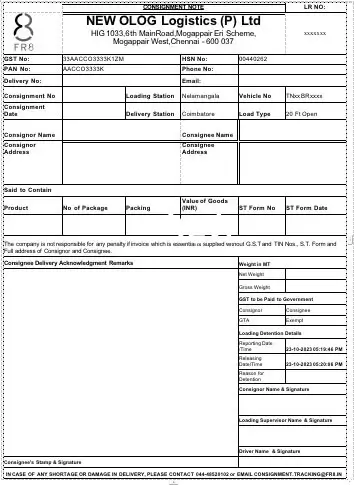Overview of the Lorry Receipt

Lorry Receipt Meaning
The full form of LR in transportation/logistics is lorry receipt. It is an important document that acknowledges the receipt of goods by a carrier (usually a lorry or truck) for transportation from one location to another.
People commonly refer to LR as bilty. It is important for both consignors and consignees.
The truck driver and consignee receive duplicate copies of the original LR, called LR copies. These copies contain the same information as the original.
LR / Bilty format

Lorry receipts come in various formats, and each logistics company may have its own version. However, they generally include the following key details:
Transporter details: This initial section is important for identifying the logistics company responsible for transporting the goods. It includes the company’s logo, name, address, GST, PAN number, phone number, HSN number, and the date when the lorry receipt is issued.
Main body of the format: The core section contains essential information, such as the LR Number (LR no means a unique identifier assigned to each and every specific shipment of goods, and it is also used for tracking and documentation purposes). It also outlines the details of the consignor (the entity sending the goods), including their name, address, and contact information, as well as the consignee (the entity receiving the goods).
Details of Goods: Here is the whole information about the goods that the consignor sends to the consignee. It will contain information like the goods description, quantity, and dimensions.
Transportation Details: This section is about the lorry responsible for carrying the goods. It contains information like mode of transport and vehicle details.
Signature: Here there will be the signatures of the respective authorities, like the consignor’s name or signature, the loading supervisor’s name or signature, and the driver’s name or signature.
Importance of LR in transport:
Evidence of Receipt:
The lorry receipt establishes that the carrier has received the goods mentioned in the document. It serves as evidence of the transfer of goods from the shipper or consignor to the carrier.
Tracking and Accountability:
Companies use lorry receipts to track the movement of goods during transportation. They help maintain accountability and provide a record of the delivery process.
Issuing Authority for LR in Transport:
Carrier:
The carrier or their authorised representative, like a transport company or logistics provider, typically issues the lorry receipt. They are responsible for taking custody of the goods and issuing the receipt to the shipper or consignor.
Need for Lorry Receipt:
Legal Requirement:
A lorry receipt may be a legal requirement in some jurisdictions for the transportation of goods. It ensures compliance with regulations and helps prevent any disputes related to the delivery of goods.
Proof of Delivery:
Lorry receipts prove that the shipper has delivered the goods to the carrier in good condition. It helps in resolving disputes or claims arising from damages, losses, or delays during transit.
Commercial and Financial Purposes:
Lorry receipts are also used for various commercial and financial purposes, such as invoicing, customs clearance, insurance, and payment settlement. They supply essential information for billing and ensure smooth transactions.
Documentation and Record-Keeping:
Lorry receipts play a crucial role in maintaining proper documentation and record-keeping for both the shipper and the carrier. They provide a trail of information about the goods, their quantity, condition, and other relevant details. (To learn about more documents related to transportation, kindly refer to our blog, Transportation Glossary.)
Example:
Let’s illustrate the importance of a lorry receipt with an example. ABC Enterprises needs to transport a 500-crate shipment of their products to a distributor in another city. XYZ Transport, takes responsibility for transporting.
Before taking possession of the crates, XYZ Transport issues a lorry receipt to ABC Enterprises. This document acknowledges that XYZ Transport has received the goods and is responsible for their safe transportation to the distributor’s location. The lorry receipt includes information such as the crate quantity, condition, special transport instructions, and the date and time of receipt.
This document serves as proof of delivery, enabling tracking and accountability, and supporting commercial purposes, including invoicing and insurance coverage throughout the transportation process.
Conclusion:
A lorry receipt is an important document in road transportation that states the maximum amount of information about the transportation. In FR8, we also provide electronic lorry receipts by using our Truck Loads app.
Frequently Asked Questions:
- What is the LR full form in logistics/ transportation?
LR full form in logistics/transportation is a lorry receipt.
- What does lorry receipt mean in transportation?
A lorry receipt, or LR, represents an important document used in transportation and logistics to acknowledge that a carrier (commonly a lorry or truck) has received goods for transportation from one place to another.
- What is the LR no in transport?
Bilty no/ LR no means a unique identifier assigned to each and every specific shipment of goods, and it is also used for tracking and documentation purposes.
- What is an LR copy?
A LR copy is a duplicate copy of the original LR that is given to the truck driver and consignee.
- What is the difference between lorry and truck?
The difference between lorry and truck lies in terminology; in British English, the term “lorry” is used, and in American English, the term “truck” is used. However, both lorry and a truck are motor vehicles designed for transporting goods.
- Can a lorry receipt be issued electronically?
Yes, lorry receipts can be issued electronically, such as in the form of a digital document or an electronic data interchange (EDI) message.
- Is a lorry receipt transferable?
Yes, depending on the terms and conditions mentioned in the lorry receipt, it can be transferable, allowing the holder to transfer ownership or possession of the goods mentioned.
- Can a lorry receipt be used as a legal document in case of disputes?
Yes, a lorry receipt can serve as a legal document to resolve disputes related to the delivery of goods during transportation, providing evidence of receipt and the conditions under which the goods were received.


